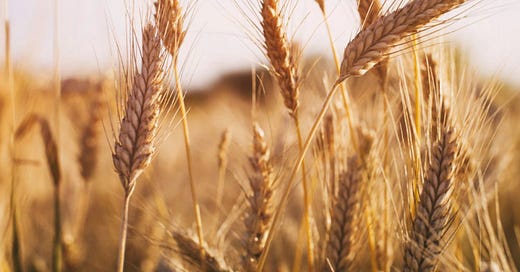ANCESTRAL EATING: Grains, an Introduction
Grains are a big topic, which I'll handle in multiple parts
Welcome back, ladies and gentlemen, to another edition of ANCESTRAL EATING. In this edition, I’ll provide an introduction to a big, and sometimes controversial, subject when it comes to eating healthily in the manner of our ancestors: the consumption of grains. How long have we been eating grains and are they necessary to achieve perfect health? Let’s find out!
The domestication of wild grains, along with wild animals like swine and cattle, is generally referred to as “the Agricultural Revolution” or “the First Agricultural Revolution”. As an event, it’s dated back to roughly 10-12,000 years ago and situated in the Near East, probably within the watersheds of the Tigris and Euphrates rivers.
The Agricultural Revolution is rightly considered one of the most important events in human history. In an essay I wrote for MAN’S WORLD Issue Six, and which I’ve also reproduced here on Substack, I paraphrase the Unabomber Ted Kaczynski’s famous opening paragraph of his “Manifesto”, substituting the Agricultural Revolution for the Industrial Revolution.
The agricultural revolution and its consequences have been a disaster for the human race. They have greatly increased the life expectancy of those of us who lived in “advanced” countries, but they have destabilised society, have made life unfulfilling, have subjected human beings to indignities, have led to widespread psychological suffering and have inflicted severe damage on the natural world. The continued development of agriculture will worsen the situation. It will certainly subject human beings to greater indignities and inflict greater damage on the natural world, it will probably lead to greater social disruption and psychological suffering, and it may lead to increased physical suffering even in “advanced countries”.
Everything Uncle Ted said about the Industrial Revolution could just as easily and as truthfully be said of the Agricultural Revolution, because the former would not in any way have been possible without the latter. No grain agriculture, no states and cities; no states and cities, no scientific progress; no scientific progress, no steam engines — etc.
It might seem a little melodramatic to suggest that everything has gone wrong since the Agricultural Revolution. I certainly don’t believe that. The Agricultural Revolution was a blessing. But it was also a curse, and it’s easy to forget that. As I note in my book The Eggs Benedict Option, societies tell themselves flattering stories about who they are and where they came from, and since modern man is the product of grain agriculture, it’s only natural that for the longest time we’ve contrasted ourselves favourably with our non-agricultural ancestors and contemporaries, whether they be pastoralists or hunter-gatherers. We are the people of culture, possessed of superior health, technology and wisdom; they are the barbarians, living beyond our walls in squalor and ignorance. The fact that agricultural civilisations were so regularly conquered by pastoralists — the earliest Indo-Europeans, Scythians, Huns, Germans, Mongols, Turks — and utilised their cavalry as elite mercenary shock troops, should tell you that this sense of superiority isn’t all that well founded…
Keep reading with a 7-day free trial
Subscribe to In the Raw to keep reading this post and get 7 days of free access to the full post archives.





